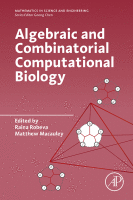Browse content
Table of contents
Actions for selected chapters
- Full text access
- Book chapterAbstract only
Chapter 1 - Multiscale Graph-Theoretic Modeling of Biomolecular Structures
John Jungck, Debra Knisley, ... Emilie Wiesner
Pages 1-34 - Book chapterAbstract only
Chapter 2 - Tile-Based DNA Nanostructures: Mathematical Design and Problem Encoding
Joanna Ellis-Monaghan, Nataša Jonoska and Greta Pangborn
Pages 35-60 - Book chapterAbstract only
Chapter 3 - Graphs Associated With DNA Rearrangements and Their Polynomials
Robert Brijder, Hendrik Jan Hoogeboom, ... Masahico Saito
Pages 61-87 - Book chapterAbstract only
Chapter 4 - The Regulation of Gene Expression by Operons and the Local Modeling Framework
Matthew Macauley, Andy Jenkins and Robin Davies
Pages 89-146 - Book chapterAbstract only
Chapter 5 - Modeling the Stochastic Nature of Gene Regulation With Boolean Networks
David Murrugarra and Boris Aguilar
Pages 147-173 - Book chapterAbstract only
Chapter 6 - Inferring Interactions in Molecular Networks via Primary Decompositions of Monomial Ideals
Matthew Macauley and Brandilyn Stigler
Pages 175-211 - Book chapterAbstract only
Chapter 7 - Analysis of Combinatorial Neural Codes: An Algebraic Approach
Carina Curto, Alan Veliz-Cuba and Nora Youngs
Pages 213-240 - Book chapterAbstract only
Chapter 8 - Predicting Neural Network Dynamics via Graphical Analysis
Katherine Morrison and Carina Curto
Pages 241-277 - Book chapterAbstract only
Chapter 9 - Multistationarity in Biochemical Networks: Results, Analysis, and Examples
Carsten Conradi and Casian Pantea
Pages 279-317 - Book chapterAbstract only
Chapter 10 - The Minimum Evolution Problem in Phylogenetics: Polytopes, Linear Programming, and Interpretation
Stefan Forcey, Gabriela Hamerlinck, ... William Sands
Pages 319-349 - Book chapterAbstract only
Chapter 11 - Data Clustering and Self-Organizing Maps in Biology
Olcay Akman, Timothy Comar, ... Josselyn Gonzales
Pages 351-374 - Book chapterAbstract only
Chapter 12 - Toward Revealing Protein Function: Identifying Biologically Relevant Clusters With Graph Spectral Methods
Robin Davies, Urmi Ghosh-Dastidar, ... Widodo Samyono
Pages 375-409 - Book chapterNo access
Index
Pages 411-418
About the book
Description
Algebraic and Combinatorial Computational Biology introduces students and researchers to a panorama of powerful and current methods for mathematical problem-solving in modern computational biology. Presented in a modular format, each topic introduces the biological foundations of the field, covers specialized mathematical theory, and concludes by highlighting connections with ongoing research, particularly open questions. The work addresses problems from gene regulation, neuroscience, phylogenetics, molecular networks, assembly and folding of biomolecular structures, and the use of clustering methods in biology. A number of these chapters are surveys of new topics that have not been previously compiled into one unified source. These topics were selected because they highlight the use of technique from algebra and combinatorics that are becoming mainstream in the life sciences.
Algebraic and Combinatorial Computational Biology introduces students and researchers to a panorama of powerful and current methods for mathematical problem-solving in modern computational biology. Presented in a modular format, each topic introduces the biological foundations of the field, covers specialized mathematical theory, and concludes by highlighting connections with ongoing research, particularly open questions. The work addresses problems from gene regulation, neuroscience, phylogenetics, molecular networks, assembly and folding of biomolecular structures, and the use of clustering methods in biology. A number of these chapters are surveys of new topics that have not been previously compiled into one unified source. These topics were selected because they highlight the use of technique from algebra and combinatorics that are becoming mainstream in the life sciences.
Key Features
- Integrates a comprehensive selection of tools from computational biology into educational or research programs
- Emphasizes practical problem-solving through multiple exercises, projects and spinoff computational simulations
- Contains scalable material for use in undergraduate and graduate-level classes and research projects
- Introduces the reader to freely-available professional software
- Supported by illustrative datasets and adaptable computer code
- Integrates a comprehensive selection of tools from computational biology into educational or research programs
- Emphasizes practical problem-solving through multiple exercises, projects and spinoff computational simulations
- Contains scalable material for use in undergraduate and graduate-level classes and research projects
- Introduces the reader to freely-available professional software
- Supported by illustrative datasets and adaptable computer code
Details
ISBN
978-0-12-814066-6
Language
English
Published
2019
Copyright
Copyright © 2019 Elsevier Inc. All rights reserved.
Imprint
Academic Press
